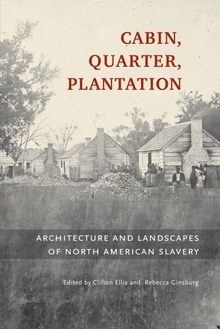Cabin, Quarter, Plantation
WARNING
You are viewing an older version of the Yalebooks website. Please visit out new website with more updated information and a better user experience: https://www.yalebooks.com
Architecture and Landscapes of North American Slavery
Edited by Clifton Ellis and Rebecca Ginsburg

Read this book online via the A&AePortal, our art and architectural history eBook platform. To learn more about how to access this book, please contact us.
Out of Print
Archaeological and historical scholarship completed over the past decade has revealed much about the built environments of slavery and the daily lives of enslaved workers in North America. Cabin, Quarter, Plantation is the first book to take this new research into account and comprehensively examine the architecture and landscapes of enslavement on plantations and farms.
This important work brings together the best writing in the field, including classic pieces on slave landscapes by W. E. B. DuBois and Dell Upton, alongside new essays on such topics as the building methods that Africans brought to the American South and information about slave family units and spiritual practices that can be gathered from archaeological remains. Through deep analysis of the built environment the authors invite us to reconsider antebellum buildings, landscapes, cabins, yards, and garden plots, and what these sites can teach us about the real conditions of enslavement. The starting point in any study of slavery and the built environment, this anthology makes essential contributions to our understanding of American slavery and to the fields of landscape history and architectural history.
“Cabin, Quarter, Plantation aims at no less than a full engagement with all aspects of the architecture of slavery. Editors Clifton Ellis and Rebecca Ginsburg have gathered a set of essays that should inspire a series of bold explorations of the buildings and structures that were--like shackles and whips--the ominous equipment of bondage across the span of three centuries.”--John Michael Vlach, George Washington University
“This collection of provocative essays provides a wide window through which to view the everyday life of slaves--where they worked, where they slept; what they built, what they ate; and where their space and the space of whites overlapped. Architecture and landscapes are made to reveal their secrets and show us not only systems of oppression but also the resourcefulness of slaves in resisting that oppression.”--Erskine Clarke, author of Dwelling Place: A Plantation Epic
Publication Date: June 29, 2010
49 b/w illus.








